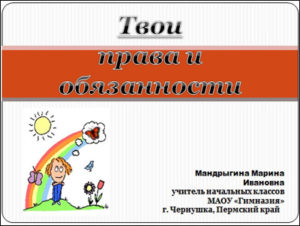teacher
MKOU "Children's Home No. 6"
d. prokopyevsk
Explanatory memorandum
Without communication, there can be no individual or human society as a whole. Communication for a person is his environment. Without communication, it is impossible to form a person’s personality, his upbringing, intellectual development, adaptation to life. Communication is necessary for people both in the process of joint work, and to maintain interpersonal relations, rest, emotional unloading, intellectual and artistic creativity.
The ability to communicate at the same time is a natural quality of every person, given by nature, and a difficult art that involves constant improvement.
Communication is a process of interaction between individuals and social groups, in which there is an exchange of activities, information, experience, skills and results of activities.
During communication:
social experience is transmitted and absorbed;
changes in the structure and essence of interacting entities;
The diversity of human individuals is formed;
There is a socialization of the individual.
Communication exists not only because of social necessity, but also because of the personal need of individuals for each other.
In communication, the individual receives not only rational information, forms ways of thinking, but also through imitation and borrowing, empathy and identification assimilates human emotions, moods, forms of behavior.
School-age children do not always follow the generally accepted rules of behavior, and they are pardoned for this. In fact, it is very unpleasant to look at screaming children, at unkemptly dressed boys and girls who do not know the elementary rules of behavior about communication in society, disrespectful to the elderly.
And is it so difficult to learn the basic rules of behavior in society: respect each other, learn to say polite words, not to shout and not to push in transport, eat carefully at the table and dress neatly?
As adults, we always require our children to follow the rules of decent behavior. But this is especially important when guests come to you or when the child is alone in public, without adults. There is no one to tell you how to act in this or that case, no one to pull, if he behaves ugly. In such situations, adulthood and independence are manifested.
But there is another important fact: the child represents his family. Do we want our families and teachers to be treated badly? But it usually happens that when we meet a rude, unbred person, we necessarily think or say something like this: Where was this child brought up? Couldn't he have been taught to behave properly in society? And even more often, people are outraged out loud: "What do you only learn at home?" In order to avoid such situations, I offer a script for an hour of communication for children of primary school age “To give joy to people, you need to be kind and polite.”
Junior school age
Section:The Step to Spiritual and Moral Knowledge.
Block.: "Academy of Parenting."
Subject:"The Joy of Communication."
Format:Hour of communication "Joy of communication" with elements of conversation.
Goals:Create a culture of communication among children.
Design: posters with statements:
- To give joy, one must be kind and polite.
- Don't respond to rudeness with rudeness.
- If you want a friend, be polite.
- When you respect others, you respect yourself.
- Treat others as you want them to treat you.
Class progress
1. Organizational moment
- Let's start with this. Let each of you call yourself by name and perform some movement or action. For example, I will say my name and clap my hands. You can stomp your feet or do something else, but so that everyone in the circle can repeat your action.
2. Introduction to the topic
We'll rest tonight.
Let's dance and sing
And most importantly, we will learn to give people joy, be friendly, attentive, learn to communicate.
What is communication? (Children's Answers)
This is what the proverbs and sayings say:
- Stay close to the people.
- Always and everywhere face the people.
- Keep in touch with the people - you will not hit your face in the dirt.
3. Main part
Practical task "Magic words"
And now we will remember and read the magic words, proverbs, learn the content and basic thoughts so that you remember them.
A mission. Discover the meaning of words and make one of the most beautiful sentences of 5 words using these magic words.
- Hello there!
- Thanks.
- Please.
- Excuse me.
- Thank you.
- Goodbye!
- Please.
- Would you please?
- Good morning!
- Good afternoon!
- Good evening!
- Good night!
"What helps us communicate"
- Guys, we learn to communicate. Do people need hands when communicating?
- How can you communicate with your hands?
A mission. Touch each other's hands. What can I say about them?
- They are warm, gentle, affectionate, kind, peaceful.
- What else can I say?
- Can someone hurt someone if they have such good hands?
- What is the meaning of facial expressions in communication, do you think?
- In communication, in the first place on experiences are quarrels, conflicts with friends, which often occur due to the inability to agree, the desire to draw attention to themselves.
Mastering the culture of communication, of course, never frees us from mistakes, but it can help us make choices in our actions more conscious, meaningful, thoughtful. It can tell us which way of communication is better to choose, so as not to hurt a person.
Since ancient times, people have looked at each other’s faces, trying to guess the mood of a person, his intentions, character. So now we will try to decipher some emotional states of a person by facial expressions.
Do you know how to “read” the emotional state of another person? For example, sadness, joy, fun, laughter, surprise, indifference, pain, pleasure.
Children try to determine the correct emotional state, and then explain why they decided to do so and how they could help the person if necessary.
Discussion “The Role of Vision in Communication”
Experiment. Call two people. They are invited to tell something interesting (the content of the book, cartoon, for example, the most interesting moment). Everyone's watching.
It's not working. What's the reason?
- Somehow uncomfortable, difficult to talk, and therefore uninteresting. Why?
- What if we turned to each other?
- The eyes are also very helpful in communicating with people.
- Is it possible to develop attention and memory?
Playing attention
Mom sent her son to the store to buy milk, butter, sour cream.
He bought milk butter, lard.
- What didn't he buy?
2. I'll read you the words. And you, shook hands, tell me which words have the letter "D". (Port, pipe, basement, west, etc.)
3. Everybody up. The teacher says one thing, naming any part of the face, and he points at the other. Whoever makes a mistake, sit down.
Musical pause
There's music. Guys read poems to music.
Aunt Sima asked.
Vitya get in the attic.
-Excuse Aunt Sima,
I'm not a farmer.
Kolya quarrels with friends
He's making fists.
The bully under his eyes.
No bruising.
The train includes three Juntas.
Whoa, whoa, whoa!
Take your seats, guys.
Grandma's gonna take it.
The lazy mother says,
- Clean your bed.
- I'd put Mom away,
I'm just a kid.
Petya fishes deftly
Maybe build a boat.
Just say hello and thank you.
Can't talk.
- How do you describe the guys you heard about in the poems? We learn the character of a person in communication with each other. What is character?
Character is a set of the main most stable psychological and spiritual qualities, properties of a person that are manifested in his behavior.
A person with character is strong-willed, firm, and a person without character is weak-willed.
The proverbs say this about character:
- What is the character, what is the action
- It's quiet, it's temperate.
- He said it like a knot.
- Character defines a person.
The strength of character lies in the ability, as they say, to keep yourself in control in any situation.
Listen to the poems about it.
Reading and discussing poems
Good word.
I got up terribly early frowning,
No roosters,
No burdocks,
No chickens or shepherds.
I didn't shout "Good morning!"
And the planes sang,
And the rivers dove,
The sun was shining.
How much power!
The garden is wet.
And a golden field.
Good morning,
It's not angry!
Uh. Moshkovskaya
Now listen to the poem by A. Barto. What words does the hero of the poem use when meeting and saying goodbye?
He's often lazy.

When you meet, say, “Good day!”
Seems like a simple word,
And he's shy, silent.
And at best, it's great.
He says hello instead.
Instead of saying goodbye.
He's not saying anything.
Or he says goodbye:
"Well, I'm going. Bye! All of it!
What words of goodbye do you use? Why?
Listen to a poem by Y. Moritz. Who's this funny and cute hedgehog talking to? How does he treat trees, birds?
The rubber hedgehog.
In the grove of Kalin,
Over the grove of aspen
On the name day to the puppy
In a raspberry hat
It was a rubber hedgehog.
With a hole in his right side.
Had a hedgehog.
Umbrella from the rain,
A hat and a couple of kaloshes.
God's Bug,
The flower head,
The hedgehog bowed affectionately.
- Hello, Christmas trees!
What do you need pins for?
Are we wolves around?
Aren't you ashamed?
It's a shame when a friend bristles.
Nice bird,
Please come down-
You lost your feather.
On the red alley,
Where the maples are,
We have a find at the bureau.
The sky is radiant,
The cloud is clear.
On the name day to the puppy
Hedgehog rubber
Walking and whistling.
A hole in his right side.
Many paths.
This hedgehog passed,
What did he give a friend?
That's him in Van.
Whistling in the bath.
A hole in his right side.
4. Feedback
- Why do they say, “The word is not a sparrow”?
When you want to say a word,
My friend, think, take your time,
It can be harsh.
It is born of the warmth of the soul.
It's curly.
He sings copper mourning.
Until you weigh the word,
Don't let him fly.
They can be happy.
And the joy of poisoning people.
They can melt the ice in winter.
And break it down.
It will give or rob,
Inadvertently, let him joke,
Think about hurting them.
Someone who listens to you.
Be your master.
5. Outcome
We all have a little sun in us. It's sun-kindness. A good person is someone who loves people and helps them. A good man loves nature and preserves it. Love and help warm like the sun.
She's doing good things in the house.
Kindness walks quietly around the apartment.
Good morning.
Good afternoon and good hour.
Good evening, good night,
It was good yesterday.
And from where, you ask,
home so much kindness,
What about this kindness?
Flowers take root,
Fish, hedgehogs, chicks?
Literature
- Litvinova, L.S. Moral and environmental education of schoolchildren / L.S. Litvinova. 5 for knowledge, 2005.
- Budarnikova, L.V. Problems of moral formation / L.S. Budarikova – Volgograd: Teacher, 2007



